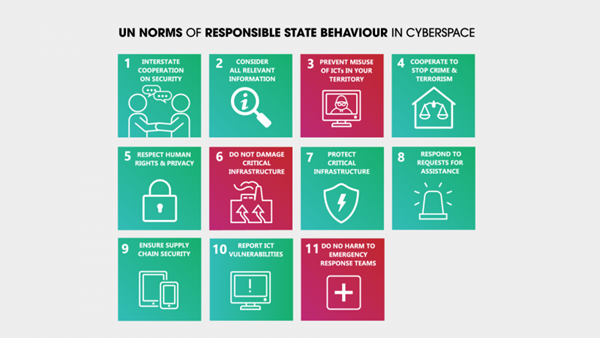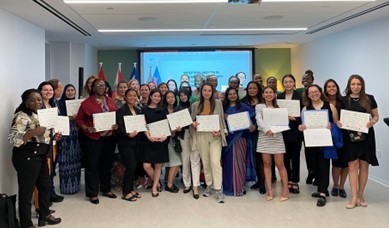Cyber Affairs and Critical Technology
DFAT engages in a range of multilateral processes and forums on cyber and critical technology issues. This engagement demonstrates our commitment to working with international partners in the multilateral system to ensure the design, development and use of critical technologies, including cyberspace, is consistent with international law and fosters a peaceful and stable international environment. DFAT shapes multilateral cyber dialogue and debate in line with Australia's values, national interests, and the international rules-based order, as set out in Australia's Cyber Security Strategy 2023-2030.
Open-Ended Working Group (OEWG) on cyber
As States increasingly exert power and influence in cyberspace, it is important that there are clear rules in place, and that these rules are upheld. The United Nations (UN) Framework for Responsible State Behaviour in cyberspace comprises international law, norms, confidence‑building measures and coordinated capacity building. All UN Member States have agreed by consensus that existing international law applies in cyberspace, and is essential to maintaining peace and stability and promoting an open, secure, stable, and accessible ICT environment. Australia will continue to leverage its role as an honest broker in UN discussions – including the UN Open-Ended Working Group (OEWG) on cyber 2021-2025, convened under the UN's First Committee (Disarmament and International Security) – to further develop the rules, norms, and principles of responsible state behaviour in cyberspace. States must act to uphold the agreed Framework for Responsible State Behaviour, calling out states when they act contrary to this framework.
Women in Cyber Fellowship
One of the projects that the Southeast Asia and Pacific Cyber Program (SEA-PAC Cyber) funds is the Women in International Security and Cyberspace Fellowship (the Fellowship). Launched in February 2020, the Fellowship is a joint initiative of the governments of Australia, Canada, the Netherlands, New Zealand, the United Kingdom and the United States. Australia is proud to support women diplomats to attend meetings of the OEWG on cyber in New York, as well as participate in UN cyber negotiation skills training and workshops. Australia supports fellows from the Pacific and Southeast Asia. The impact of the Fellowship is tangible and quantifiable, empowering women to participate in UN cyber processes and resulting in increased participation of women in the OEWG.
Regional engagement
An essential part of our multilateral cyber engagement is an enhanced role in our region. Australia (DFAT) is an active member of the ASEAN Regional Forum (ARF) on Information and Communication Technologies (ICTs) Security work stream, comprised of the working-level Open Ended Study Group on Confidence Building Measures and the senior officials-level Inter-Sessional Meeting on Security of and in the Use of Information and Communications Technologies. Australia will continue to work alongside ASEAN partners to ensure the cyber workstream advances tangible and meaningful proposals that address real regional needs and build trust and confidence among states in the region.
Cybercrime
Australia, and our region, faces a worsening cybercrime landscape characterised by expanding threats, low barriers to entry, and increasingly resourceful actors. International cooperation is an essential part of Australia's efforts to combat cybercrime, as no country can eliminate cybercrime alone. Australia has been a party to the Council of Europe Convention on Cybercrime (Budapest Convention) since 2013. The Budapest Convention is an established and proven mechanism that ensures the interoperability of legal frameworks relating to domestic cybercrime offences; electronic evidence collection by law enforcement; and international cooperation and assistance. Australia supports global efforts to adopt and implement the Budapest Convention.
In addition, Australia was committed to working with all Member States in the United Nations to negotiate the UN Convention against Cybercrime (the Convention) in the Ad Hoc Committee (AHC) on Cybercrime. Uplifting and harmonising cybercrime legislation, investigation, and international cooperation across all 193 UN Member States will narrow the operating space of organised cybercrime groups, and help eliminate unintentional safe havens.
Australia welcomed consensus adoption of the Convention by the UN General Assembly in December 2024, following three years of negotiations in New York and Vienna. The Convention is the first-ever UN endorsed instrument addressing cybercrime, criminalising significant cyber offences and creating a robust framework to enhance international legal cooperation and sharing of electronic evidence for these and other serious crimes. Viet Nam will host a high-level signing ceremony for the Convention in mid-2025 in Hanoi.
Of note, the Convention establishes new international offences that address the significant harms caused by technology-facilitated abuse such as child sexual exploitation and abuse material, grooming of children online and non-consensual sharing of intimate images by adults.
Internet Governance
Australia is a strong supporter of an open, free, safe and secure Internet, and advocates for policy settings that support this position. Australia will continue its engagement in key international multistakeholder organisations and forums. This includes the Internet Corporation for Assigned Names and Numbers (ICANN) and global and regional Internet Governance Forums (IGFs). Central to our interests in a peaceful and stable cyberspace is preserving the multistakeholder model of Internet governance. Australia opposes efforts to bring the technical management and governance of the Internet under government control, and supports and strengthens capacity for all stakeholders, including industry and civil society, to engage in multistakeholder Internet governance mechanisms.


